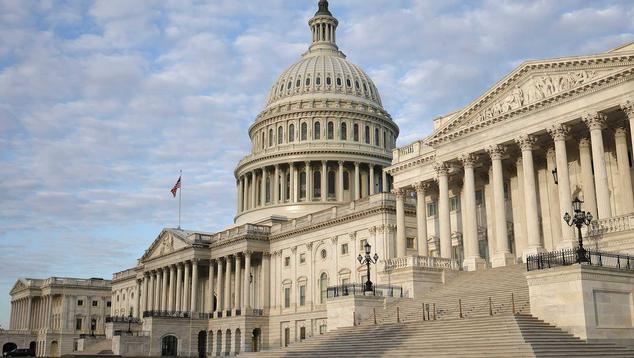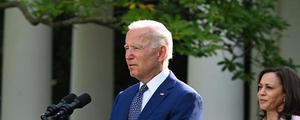Story Highlights
- Trust in federal government to handle international problems at record-low 39%
- Confidence in judicial branch is at 54%, down 13 points since 2020
- Rare decline in trust in local government to handle local problems
WASHINGTON, D.C. -- Americans' trust and confidence in various aspects of the government in the U.S. are low when compared with the historical average for each.
- Trust in the federal government's handling of international problems has fallen nine percentage points since last year to a record-low 39%, and now matches the level of trust for its handling of domestic problems -- one of only a few times that has occurred.
- Confidence in the three branches of the federal government is low on a relative basis. Although a 54% majority of U.S. adults trust the judicial branch, this is down 13 points compared with 2020.
- Americans' trust in their state and local governments' ability to handle problems under their purview continues to be higher than trust in the federal government and its three individual branches. As has been the case in recent years, confidence in local government (66%) remains higher than it is for state government (57%).
| 1997-2021 average | 2020 | 2021 | |
|---|---|---|---|
| % | % | % | |
| Federal government: | |||
| Federal government handling international problems | 59 | 48 | 39 |
| Federal government handling domestic problems | 53 | 41 | 39 |
| Federal government branches: | |||
| Judicial branch | 68 | 67 | 54 |
| Executive branch | 52 | 43 | 44 |
| Legislative branch | 47 | 33 | 37 |
| State and local governments: | |||
| State government handling state problems | 62 | 60 | 57 |
| Local government handling local problems | 70 | 71 | 66 |
| Gallup | |||
The latest data are from Gallup's Sept. 1-17 Governance poll. Perhaps contributing to this year's depressed government ratings, the poll was conducted just after the U.S. military completed the evacuation of more than 120,000 people from Afghanistan in what the highest-ranking U.S. military officer called a "logistical success, but a strategic failure." The end of the 20-year war saw the Taliban's quick takeover of most of the country and a suicide bombing at the Kabul airport, which killed 13 U.S. service members. Over the same period, the COVID-19 infection rate in the U.S. continued to surge due to the highly contagious delta variant.
Trust in Federal Government's Handling of International Problems at New Low
Over the past two decades, the percentage of Americans expressing a "great deal" or "fair amount" of confidence in the federal government's handling of international problems has outpaced perceptions of its handling of domestic problems by as much as 15 points. The latest readings, however, are identical, which last occurred in 2006.
In the past few years, Americans' trust in the government's handling of domestic problems has not strayed far from the record low of 35% in 2019. The latest 39% is statistically unchanged compared with last year's 41%. At the same time, trust in handling international issues has plummeted from 48% to 39% since last year, and the recent events in Afghanistan likely have played a role in that decline.
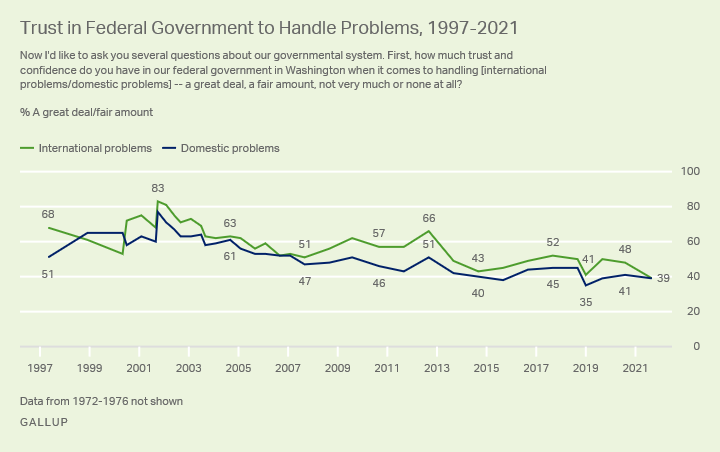
Line chart. Percentage of Americans expressing a great deal or fair amount of trust in the federal government's handling of international and domestic problems since 1997. The current reading for each is 39%. The reading for domestic problems is essentially unchanged from last year's 41% while the reading for international problems fell nine points since 2020.
Partisans' trust in the federal government's management of both domestic and international issues has swung sharply based on the party of the president occupying the White House. That is, when George W. Bush and Donald Trump were president, Republicans were much more trusting of the government's handling of problems at home and abroad than Democrats were. The opposite was true during Barack Obama's presidency, and that pattern is at play once again with Biden in office. Independents' confidence in the government's handling of both domestic and foreign problems has been more stable than Republicans' and Democrats' but has shown clear signs of decline in the past two decades.
Republicans' current levels of trust in the federal government's handling of international (15%) and domestic (18%) problems are the lowest recorded by Gallup for any party group historically. Democrats' degrees of trust in the government's international (75%) and domestic (71%) problem-solving are similar to readings when Obama was president. For their part, independents' confidence in the government's ability to deal with domestic challenges (32%) is essentially unchanged from last year, although it is slightly higher than the low point for independents, registered amid the federal government shutdown in January 2019. The reading for international challenges among independents is down seven points, to 32%, a new low for that group.
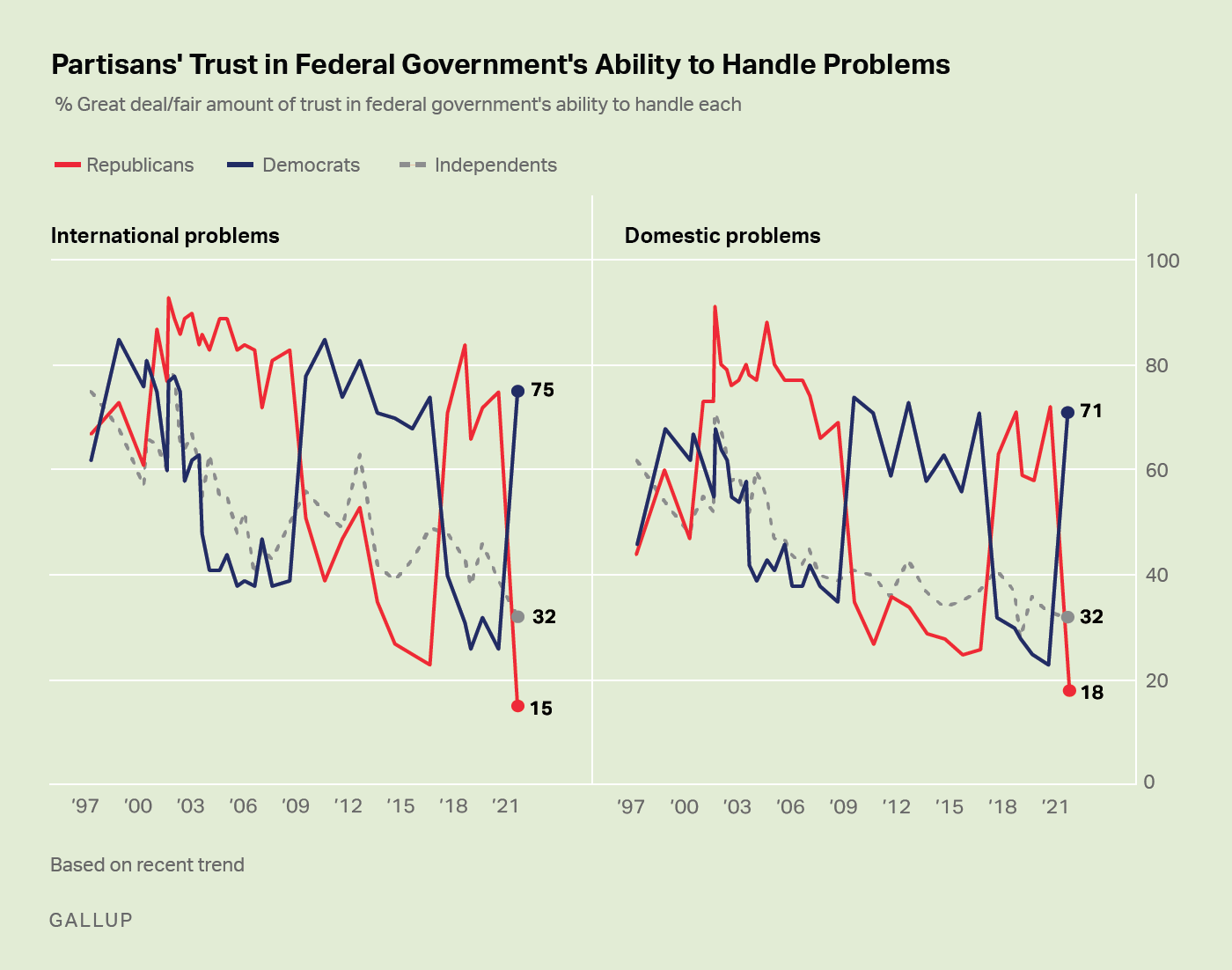
Custom graph. Two line graphs showing the percentages of Republicans, Democrats and independents who have a great deal or fair amount of trust in the federal government's ability to handle international and domestic problems since 1997. Over that time, Republicans' and Democrats' trust have changed based on the party of the president. The latest 15% of Republicans who trust the government's ability to handle international problems and the 18% who trust it on domestic issues are the lowest recorded for the group since 1997. Democrats' 75% trust in the government's international and 71% trust in domestic (71%) handling are similar to readings when Obama was president. Independents' confidence in the government's ability to deal with domestic challenges (32%) is essentially unchanged from last year, but slightly higher than the low point for independents. The reading for international challenges among independents is down seven points, to 32%, a new low for that group.
Trust in Judicial Branch Falls Sharply as Executive, Legislative Remain Low
In every reading dating back to 1997, the public has expressed more trust in the judicial branch of the federal government than in the executive and legislative branches. Although it remains the most trusted of the three branches, Americans' trust in the judicial branch (headed by the U.S. Supreme Court) has dropped precipitously, to a nearly record-low 54%. This decline comes at a time when approval of the U.S. Supreme Court has hit its historical low point after drawing the ire of many Americans for refusing to block a Texas law banning most abortions, ending a nationwide eviction moratorium and refusing to block vaccine mandates on college campuses.
Over the past decade, U.S. adults' confidence in the executive branch (headed by the president) has exceeded confidence in the legislative branch (composed of both houses of Congress). Currently, 44% of Americans say they trust the executive branch and 37% trust the legislative branch. The executive branch reading has been steady since 2017, while confidence in the legislative branch has risen slightly this year but has not climbed above 40% since 2009.
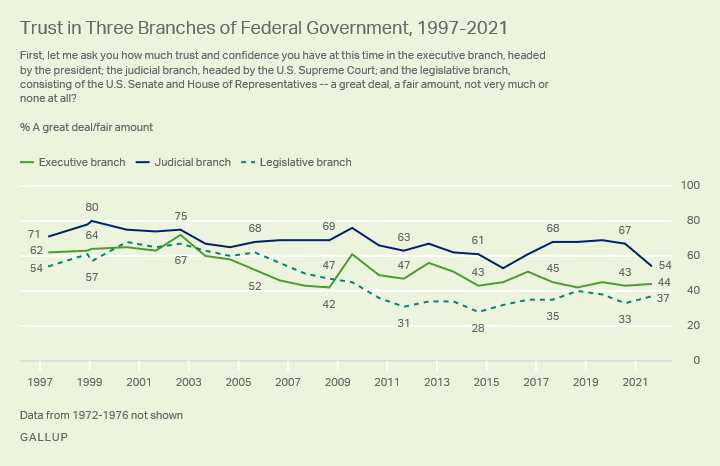
Line chart. Percentage of Americans expressing a great deal or fair amount of trust in each of the three branches of the federal government since 1997. The latest readings are 54% for the judicial branch, 44% for the executive branch and 37% for the legislative branch. Trust in the judicial branch has fallen 13 percentage points since last year. Trust in the executive branch is steady since 2020 and trust in the legislative branch is up a modest four points.
Americans in all party groups have lost considerable confidence in the judicial branch over the past year. Republicans' trust is down 23 points, Democrats' fell eight points, and independents' declined 12 points since 2020, when Republicans were much more trusting of the judicial branch than were the other party groups. Republicans remain the most confident in the judiciary at 61%, compared with 50% of Democrats and 51% of independents. Trust among Democrats and independents are at their lowest points in Gallup's trend.
Partisans' confidence in the executive branch -- and to a lesser degree, the judicial and legislative branches -- have been affected by Democratic victories in the presidential and U.S. Senate elections, with partisans' trust now almost entirely dependent on which party occupies the White House. As such, with Biden replacing Trump in office, Democrats' trust in the executive branch grew 81 points and Republicans' fell 84 points from last year. Independents' trust was largely unaffected by the change in presidential administrations, staying relatively steady at 39%.
When it comes to confidence in the legislative branch, Democrats' grew 16 points to 54%, independents' increased seven points to 36% and Republicans' fell 11 points to 22%. Democrats won control of the U.S. Senate in the 2020 elections and retained control of the House of Representatives, which they had won in 2018.
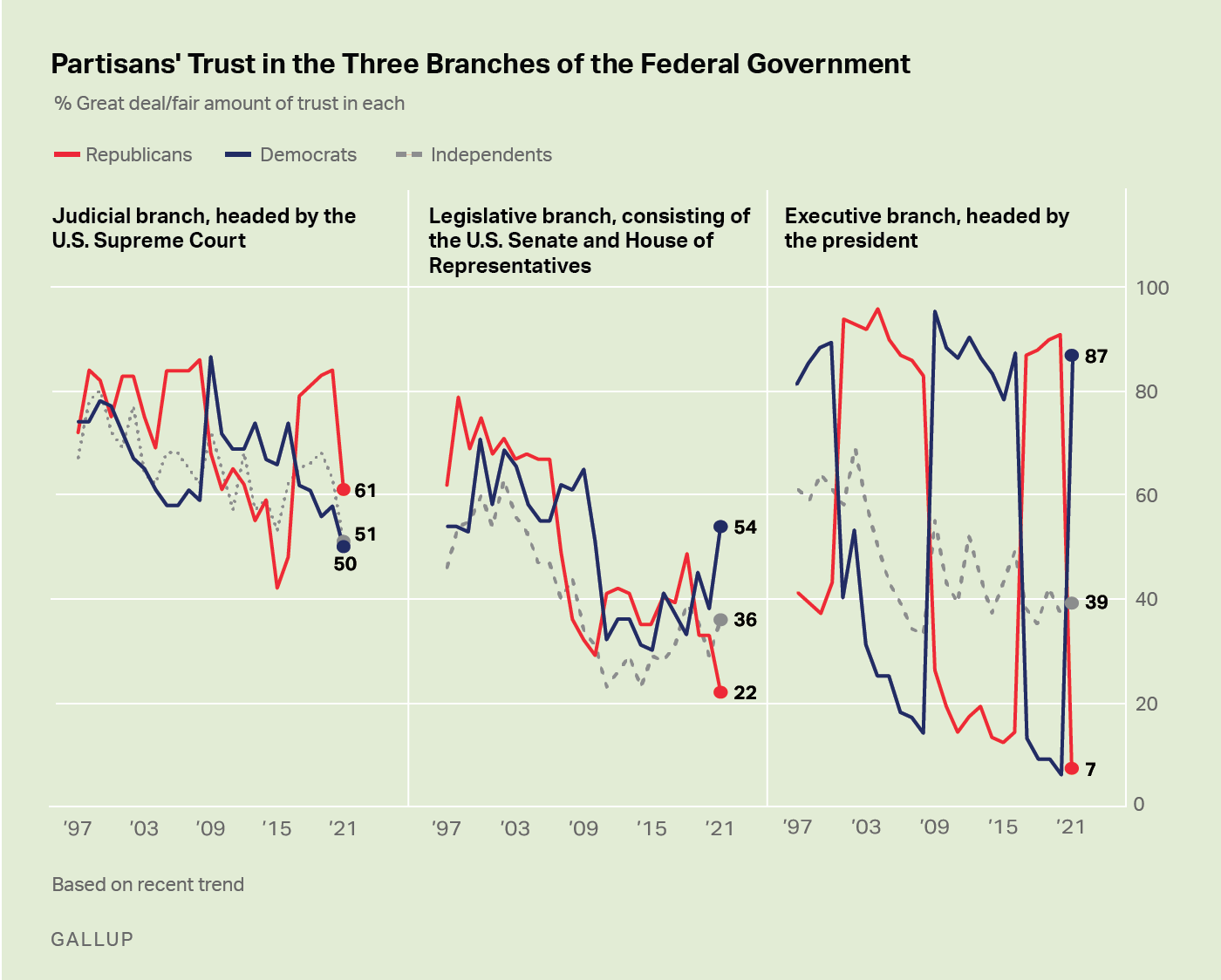
Custom graph. Three line graphs showing the percentages of Republicans, Democrats and independents who have a great deal or fair amount of trust in the ability of the judicial, legislative and executive branches of the federal government to handle problems since 1997. All party groups have lost considerable confidence in the judicial branch over the past year. Republicans' trust is down 23 points, Democrats' fell eight points and independents' declined 12 points since 2020, when Republicans were much more trusting of the judicial branch than the other party groups. Republicans remain the most confident in the judiciary, at 61%, compared with 50% of Democrats and 51% of independents. Trust in the judicial branch among Democrats and independents are at their lowest points in Gallup's trend. Since 2020, Democrats' trust in the executive branch grew 81 points and Republicans' fell 83 points from last year. Independents' trust in the executive branch was largely unaffected by the change in presidential administration, staying relatively steady at 39%. Democrats' confidence in the legislative branch grew 16 points to 54% since last year, independents' increased seven points to 36%, and Republicans' fell 11 points to 22%.
Trust in State and Local Governments Higher Than Federal Government
Americans have consistently expressed majority-level trust in their own state and local governments to handle problems in their area, and since 2008, confidence in local government has edged out state government. Each reading has dipped slightly since 2020, and the 66% of U.S. adults who now say they trust their local government is the lowest since 1997, although it was lower in 1972 and 1976. Meanwhile, the 57% trust reading for state government is well above the 51% record low measured in 2009 when most states had to raise taxes or make cuts to mitigate budget shortfalls during the Great Recession.
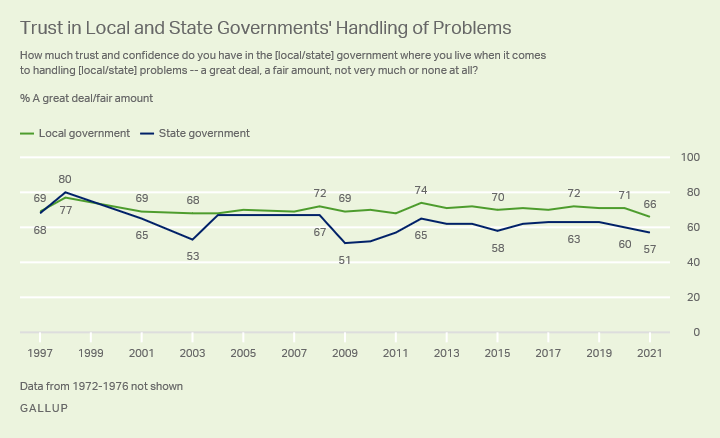
Line chart. Percentage of Americans expressing a great deal or fair amount of trust in their own local and state governments to handle problems in their area since 1997. Both readings have edged down since 2020. Trust in local government is now at its lowest point on record - 66%. Still, Americans remain more inclined to trust their local government than their state government (57%).
While majorities of all three party groups say they have confidence in their state and local governments, Democrats are at least slightly more likely than Republicans and independents to do so. Seventy-three percent of Democrats, 70% of Republicans and 60% of independents trust their local government. Similarly, 62% of Democrats, 55% of Republicans and 53% of independents have confidence in their state government.
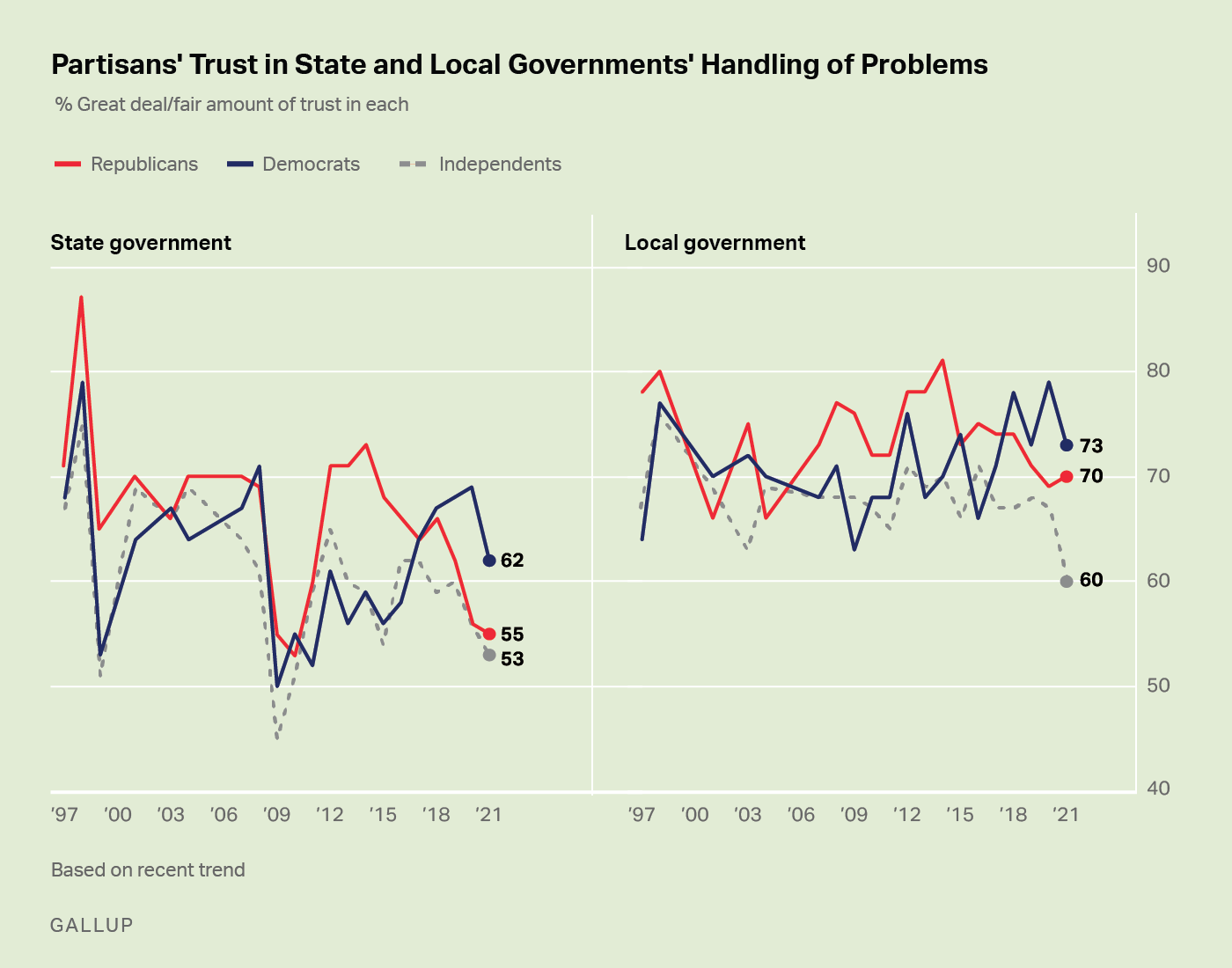
Custom graph. Two line graphs showing the percentages of Republicans, Democrats and independents who have a great deal or fair amount of trust in the ability of state and local governments to handle problems since 1997. While majorities of all three party groups say they have confidence in their state and local governments, Democrats are at least slightly more likely than Republicans and independents to do so. Seventy-three percent of Democrats, 70% of Republicans and 60% of independents trust their local government. Similarly, 62% of Democrats, 55% of Republicans and 53% of independents have confidence in their state government.
Bottom Line
Americans' trust in many aspects of government in the U.S. is low -- particularly among Republicans, who register some record lows with their party out of power in Washington. Independents' trust is also notably weak, and any increases in Democrats' trust appear to be tied to their party's control of the White House and Congress.
The sharply polarized nation is grappling with weighty issues, including the COVID-19 pandemic, the rocky end to the war in Afghanistan, the Supreme Court's action and inaction on controversial cases, the crisis at the southern U.S. border, and another potential government shutdown over raising the debt limit. Finding common ground is increasingly difficult in the U.S., but without it, trust in government will likely remain low and lopsided.
To stay up to date with the latest Gallup News insights and updates, follow us on Twitter.
Learn more about how the Gallup Poll Social Series works.
